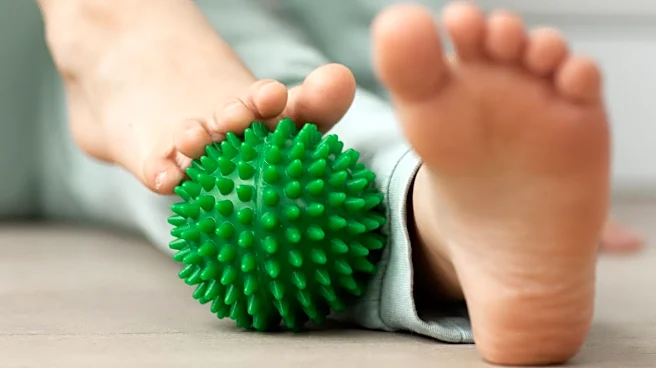What is the story about?
What's Happening?
A recent randomized controlled trial has demonstrated that maternal multisensory stimulation can significantly reduce neonatal pain and maternal anxiety during medical procedures. Conducted between July 2019 and January 2020, the study involved 80 newborns divided into intervention and control groups. Mothers in the intervention group provided multisensory stimulation, including speech, touch, skin odor, breastfeeding, and eye contact, while the control group received routine care. The results showed that the Neonatal Infant Pain Scale (NIPS) scores and maternal anxiety levels were significantly lower in the intervention group, indicating the effectiveness of this approach. The study highlights the importance of incorporating maternal involvement in neonatal care to enhance comfort and emotional well-being.
Why It's Important?
The findings of this study have significant implications for neonatal care practices. By demonstrating that maternal multisensory stimulation can alleviate pain and anxiety, the study suggests a non-invasive, cost-effective method to improve neonatal outcomes. This approach could lead to changes in hospital protocols, encouraging more active maternal participation during neonatal procedures. The reduction in pain and anxiety not only benefits the infants but also supports maternal mental health, potentially leading to better long-term outcomes for both. Healthcare providers and pediatric nurses may need to consider these findings to enhance the quality of care provided to newborns and their mothers.
What's Next?
The study's results may prompt further research into the specific components of multisensory stimulation that are most effective. Hospitals and neonatal care units might begin to implement training programs for nurses and parents to incorporate these techniques into standard care practices. Additionally, there could be an increase in advocacy for policies that support maternal involvement in neonatal care, potentially influencing healthcare guidelines and standards. As awareness grows, more healthcare facilities may adopt these practices, leading to widespread improvements in neonatal care.
Beyond the Headlines
This study also raises questions about the broader implications of maternal involvement in early childhood development. The positive effects observed in neonatal pain and anxiety management could extend to other areas of infant care, suggesting that maternal presence and interaction play a crucial role in early development. This could lead to a reevaluation of current practices in pediatric care, emphasizing the importance of family-centered approaches. Furthermore, the study may inspire similar research in other areas of healthcare, exploring the potential benefits of multisensory stimulation in different patient populations.















